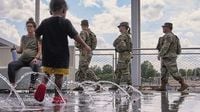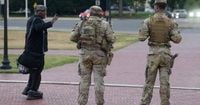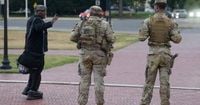On Monday, August 25, 2025, the first day of school in Washington, D.C. was anything but ordinary. As students returned to their classrooms after the summer break, they were greeted not just by teachers and friends, but also by thousands of National Guard troops and federal law enforcement officers patrolling the city’s streets. Some of these troops, now visibly armed, were acting under the direct orders of President Donald Trump, who has framed the move as a necessary step to make the nation’s capital safer. But for many parents and city leaders, the presence of armed military personnel near schools has sparked deep anxiety and fierce debate about the true cost of such extraordinary security measures.
The tension was palpable across the city. According to the Associated Press, parents voiced unease about what the military presence might mean for their children’s safety and sense of normalcy. “Parents are anxious. We’ve heard from a lot of them,” Mayor Muriel Bowser told reporters at a news conference. She highlighted that some families, particularly those concerned about immigration enforcement, might even keep their children home. “Any attempt to target children is heartless, is mean, is uncalled for and it only hurts us. I would just call for everybody to leave our kids alone,” Bowser said, underscoring her plea for a return to normalcy for the city’s youngest residents.
Rumors swirled through parental social media groups and neighborhood listservs, with reports of checkpoints and arrests creating a climate of unease. The sight of armed troops—some from as far away as Ohio, South Carolina, and Tennessee—was jarring for many. An AP photographer observed about 30 National Guard members on the National Mall on Monday morning, noting that they were unarmed. However, other patrols near the city’s convention center were seen carrying pistols, a change that stemmed from a directive issued late the previous week by Defense Secretary Pete Hegseth.
The military task force overseeing the operation clarified that the rules for the use of force remain strict: troops are authorized to act "only as a last resort and solely in response to an imminent threat of death or serious bodily harm." Defense Secretary Hegseth defended the decision to arm some troops, telling the Associated Press that it was "common sense" to ensure they were "capable of defending themselves and others." Yet, the task force also noted that the National Guard’s duties included not just patrolling, but also more mundane tasks like picking up trash—though how much time would be spent on such activities was left unclear.
President Trump has been quick to tout the results of his administration’s policing efforts in Washington. In a statement Monday, he claimed, “We took hundreds of guns away from young kids, who were throwing them around like it was candy. We apprehended scores of illegal aliens. We seized dozens of illegal firearms. There have been zero murders.” According to administration figures, more than 1,000 people have been arrested in the city since August 7, including 86 on Sunday, August 24 alone.
But the president’s approach has not gone unchallenged. Mayor Bowser has remained steadfast in her opposition to the military presence. “I don’t believe that troops should be policing American cities,” she told the AP. Her concerns are echoed by many city leaders and parents, who argue that the presence of armed troops near playgrounds and school entrances is more intimidating than reassuring, especially for children already facing the stress of a new school year.
The controversy is far from confined to Washington. President Trump has signaled his intention to expand National Guard deployments to other Democratic-led cities, including Baltimore, Chicago, and New York, arguing that these cities require federal intervention to curb crime. The mere suggestion has sparked immediate backlash in places like Chicago, where officials argue that violent crime is actually on the decline. According to police data, shootings and homicides in Chicago dropped by more than 30% in the first half of 2025 compared to the same period last year, with total violent crime down by over 22%.
Chicago’s Mayor Brandon Johnson called the prospect of military deployment unconstitutional, while Illinois Governor JB Pritzker dismissed it as unnecessary and a distraction. “Mr. President, do not come to Chicago,” Pritzker said pointedly, standing near the city’s Trump-branded skyscraper. He added, “I will fight the petty whims of an arrogant little man who wants to use the military to occupy a U.S. city, punish his dissidents and score political points.” Former Chicago Police Superintendent Garry McCarthy also expressed skepticism about the effectiveness of military patrols, suggesting that if the National Guard were to be used at all, it should be in a limited, supportive role alongside local police.
Community leaders in Chicago, especially in neighborhoods like Austin on the West Side, are also wary. Pastor Ira Acree, who leads a congregation in Austin, said he had received numerous calls from congregants upset about the possibility of military deployments. “This is a joke. This move is not about reducing violence. This is reckless leadership and political grandstanding. It’s no secret that our city is on the president’s hit list,” Acree told the AP.
Washington’s experience is not unique. In June 2025, roughly 4,000 National Guard troops and 700 Marines were deployed to Los Angeles in response to protests over the Trump administration’s immigration crackdown—a move that was met with strong opposition from California Governor Gavin Newsom and other local officials. National Guard troops have also been used in Chicago during the 2024 Democratic National Convention and the 2012 NATO Summit, though those deployments were far less controversial than the current proposals.
As the week unfolds, the debate over the necessity and impact of armed military patrols in American cities shows no sign of abating. For now, parents in Washington face the difficult choice of sending their children to school under the watchful eyes of soldiers, wondering whether the city is any safer—or simply more unsettled—because of it. City leaders and community members continue to call for a focus on education and community investment, rather than military intervention, as the best way to ensure the safety and well-being of children.
With the school year just beginning, the question of how best to balance security and community trust remains unresolved. But one thing is clear: for many families in the nation’s capital, the first day of school in 2025 will be remembered less for the excitement of new beginnings, and more for the uneasy presence of troops on their city’s streets.



